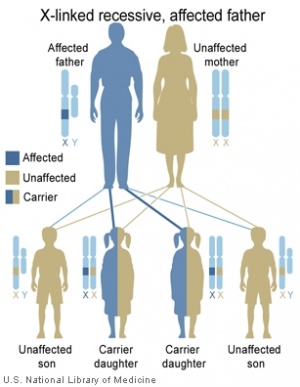Fragile X Syndrome
Introduction
Fragile X Syndrome (Mental Retardation, X-linked, associated with marXq28, X-linked mental retardation and macroorchidism, Marker X syndrome, Martin-Bell syndrome).
Most cases result from the unstable expansion of a CGG repeat in the FMR1 gene and abnormal methylation, leading to repression of FMR1 transcription and subsequent decreased protein levels in the brain.
International Classification of Diseases code (Q99.2 Fragile X chromosome Fragile X syndrome).
Undergraduate Science students project 2011 Fragile X Syndrome.
Some Recent Findings
|
Recent References | References | PubMed
International Classification of Diseases
The International Classification of Diseases (ICD) World Health Organization's classification used worldwide as the standard diagnostic tool for epidemiology, health management and clinical purposes. This includes the analysis of the general health situation of population groups. It is used to monitor the incidence and prevalence of diseases and other health problems. Within this classification "congenital malformations, deformations and chromosomal abnormalities" are (Q00-Q99) but excludes "inborn errors of metabolism" (E70-E90).
Q99 Other chromosome abnormalities, not elsewhere classified
- Q99.2 Fragile X chromosome Fragile X syndrome
Fragile X-associated Tremor
(Ataxia Syndrome) A mainly male adult-onset condition that causes tremor and affects balance and memory in some "carriers" of the Fragile X gene. Because of the adult onset, this can be mistaken for a range of other neurological disorders including Parkinson's and Alzheimer's disease.
Prevalence
Screening
Screening By Country
Mouse Model
References
- ↑ <pubmed>22797890</pubmed>
Journals
NCBI Bookshelf
- Modern Genetic Analysis Griffiths, Anthony J.F.; Gelbart, William M.; Miller, Jeffrey H.; Lewontin, Richard C. New York: W. H. Freeman & Co.; c1999.
- Introduction to Genetic Analysis 7th ed. Griffiths, Anthony J.F.; Miller, Jeffrey H.; Suzuki, David T.; Lewontin, Richard C.; Gelbart, William M. New York: W. H. Freeman & Co.; c1999.
- Clinical Methods 3rd ed. Walker, H.K.; Hall, W.D.; Hurst, J.W.; editors Stoneham (MA): Butterworth Publishers; c1990 Table - Recognizable Genetic Conditions
Reviews
<pubmed></pubmed> <pubmed></pubmed>
Articles
<pubmed></pubmed>
Associated Neurological
<pubmed></pubmed> <pubmed></pubmed> <pubmed></pubmed> <pubmed></pubmed>
Books
Note: books are listed for educational and information purposes only and does not suggest a commercial product endorsement.
OMIM
Search PubMed
Search PubMed Now: Fragile X Syndrome
External Links
External Links Notice - The dynamic nature of the internet may mean that some of these listed links may no longer function. If the link no longer works search the web with the link text or name. Links to any external commercial sites are provided for information purposes only and should never be considered an endorsement. UNSW Embryology is provided as an educational resource with no clinical information or commercial affiliation.
- USA - National Fragile X Foundation
- Australia - Fragile X Association of Australia
Glossary Links
- Glossary: A | B | C | D | E | F | G | H | I | J | K | L | M | N | O | P | Q | R | S | T | U | V | W | X | Y | Z | Numbers | Symbols | Term Link
Cite this page: Hill, M.A. (2024, April 23) Embryology Fragile X Syndrome. Retrieved from https://embryology.med.unsw.edu.au/embryology/index.php/Fragile_X_Syndrome
- © Dr Mark Hill 2024, UNSW Embryology ISBN: 978 0 7334 2609 4 - UNSW CRICOS Provider Code No. 00098G
